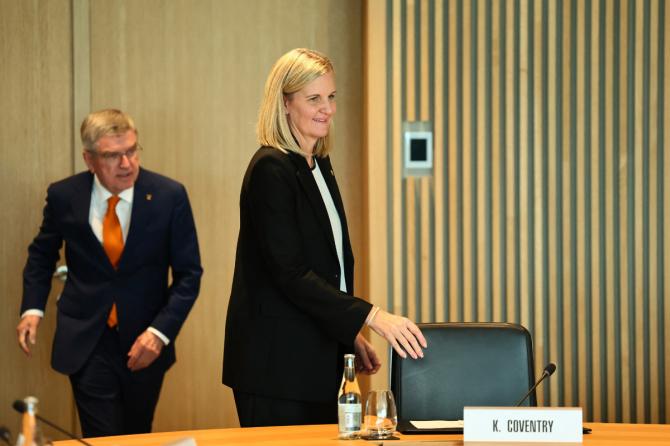Our Terms & Conditions | Our Privacy Policy
‘Compensation of athletes, IOC’s main concern’

IMAGE: New IOC chief Kristy Coventry (foreground). Photograph: Denis Balibouse/Reuters
American athletics legend Edwin Moses spoke about the recent change of guard in the International Olympic Committee in which Kirsty Coventry won the elections to succeed Thomas Bach as the body’s first woman and African president.
Moses said the first task for the Zimbabwean would be to ensure fair compensation for track and field athletes, who he believes, have long been underpaid compared to their peers from other sports.
“I think the main concern for me would be compensation of athletes,” Moses said when questioned on issues the new IOC president should prioritise after assuming office.
“Because you have professional athletes from golf, tennis, basketball, soccer coming into the Olympic movement and then you have your classical sports like track and field, gymnastics, swimming. And these people are still uncompensated,” he said.
However, ahead of the Paris Olympic Games last year, World Athletics became the first international body to offer hefty prize money for Olympic medallists.
Drawing comparisons with other professional sports, Moses said track and field athletes have missed out on the financial boom due to the lack of a players’ union.
“When I was running in 1978, the prize money for winning the men’s Wimbledon Championship was USD 80,000. Tennis was unionised. Track and field wasn’t,” said Moses, who won the 400m hurdles gold medals at the 1976 Montreal and 1984 LA Olympics.
“In American basketball, in 1981–82, Kareem Abdul-Jabbar was making USD 1.2 million a year and people thought that was blasphemy… But their union became strong. Look at where their salaries are now.
“Track and field did nothing. Football, baseball, all those sports have really strong unions. They’re making millions of dollars a year. And Olympic sports? They’ve been consistently absent from that group and that endeavour.”
Moses pointed out that only a few exceptional athletes like Usain Bolt have managed to build lucrative global brands. He recalled earning well personally in the early 1980s due to a temporary relaxation of amateur rules.
“Track and field is going to continue falling behind until it unionises. And I think there are people who don’t want that to happen because it would have implications for a lot of other sports,” he explained.
[ad_1]
Images are for reference only.Images and contents gathered automatic from google or 3rd party sources.All rights on the images and contents are with their legal original owners.
[ad_2]



Comments are closed.